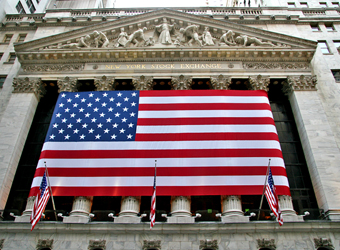U.S. equities closed mostly lower on Wednesday as investors dealt with plunging oil prices and digested scorching employment data.
The Dow Jones industrial average fell about 70 points, with Caterpillar and Chevron contributing the most losses.
The S&P 500 closed 0.2 percent lower, with energy falling more than 2.5 percent to lead decliners.
U.S. crude prices fell 5.38 percent to settle at $50.28 per barrel after data from the Energy Information Administration showed inventories rose by 8.2 million barrels last week.
“The report is certainly a negative in the short term,” said Tamar Essner, an energy analyst at Nasdaq, adding: “If you’re an equity investor in the U.S., you’re not going to want to put money to work in energy because inventories are so critical at this point.”
She also said that comments made by Saudi officials earlier this week on production cuts have also been pressuring the commodity.
“That sort of puts into question that perceived floor around $50,” she further said.
WTI also posted its worst one-day performance in 13 months.
“I think we’re seeing some equilibrium in the $45-$55 range,” said Eric Aanes, president and founder of Titus Wealth Management. “Personally, I’d like to see it higher, … but barring some Middle East political event, I think we’re going to remain range-bound.”
The Nasdaq composite outperformed, closing above breakeven.
On the data front, private sector employment rose by 298,000 jobs last month, according to ADP and Moody’s, well above a Reuters estimate of 190,000. The report encompassed the first full month under President Donald Trump, who has pledged to rebuild the nation’s aging infrastructure system.
The data come just days ahead of the U.S. government’s nonfarm payrolls report.
Goldman Sachs and UBS raised their forecasts for the headline nonfarm payrolls figure after the strong ADP report.
Treasury yields popped following the data release, with the benchmark ten year-yield hitting its highest level since December and the two-year note yield reaching levels not seen since 2009.
“That’s a very strong report. That could mean a more aggressive Fed and that could be a negative for stocks,” said Bruce Bittles, chief investment strategist at Baird, referring to the ADP report, adding: “But the fact that stocks are holding up here is surprising.”
The Federal Reserve is scheduled to meet next week and is widely expected to tighten monetary policy.
According to the CME Group’s FedWatch tool, market expectations for a March rate hike were around 91 percent.
Other data released Wednesday included fourth-quarter productivity, which remained unrevised at a gain of 1.3 percent. Wholesale inventories fell 0.2 percent, more than expected.
Stocks have been on a tear lately amid a backdrop of improving economic data and the prospects of pro-growth policies being enacted by Trump’s administration.
Over the past month, the three major U.S. indexes had gained at least 2.67 percent entering Wednesday’s session.
But equities have hit a soft patch this week, amid concerns that Trump will not be able to deliver on his promises as fast as it expected and worries that the market may be too expensive at this point.
“Obviously, Trump is pro-growth, but unless we get some confirmation on tax reform and tax cuts, we’re going to hold in a trough here,” said Titus’ Aanes.
The S&P was on track to snap a six-week winning streak.
“It’s kind of funny because, about a month ago, it was the bond market taking a wait-and-see approach; now it’s stocks,” said Nick Raich, CEO at The Earnings Scout.
“They are not moving in tandem at all,” Raich noted.
“I think the stock market is catching up to the bond market, saying ‘things are going to be great, but not as great as we thought,'” he said.
That said, hedge fund manager David Tepper told CNBC’s “Squawk Box” on Wednesday that it’s hard to short stocks despite their current valuations, adding he is short bonds.
The iShares 20+ year Treasury Bond ETF (TLT) fell in the premarket following those remarks and traded about 0.5 percent lower.
In corporate news, Caterpillar’s stock fell after The New York Times reported that a new government report accused the company of using improper accounting methods to boost its stock price.
The U.S. dollar rose 0.28 percent against a basket of currencies, with the euro near $1.054 and the yen around 114.3.
Overseas, European stocks rose broadly, with the pan-European Stoxx 600 index advancing 0.08 percent. In Asia, equities closed mixed, with the Nikkei 225 falling 0.47 percent and the Shanghai composite ending nearly flat.
The Dow Jones industrial average fell 69.03 points, or 0.33 percent, to close at 20,855.73, with Caterpillar leading decliners and Wal-Mart the top advancer.
The S&P 500 declined 5.41 points, or 0.23 percent, to end at 2,362.98, with energy leading seven sectors lower and consumer discretionary outperforming.
The Nasdaq composite rose 3.62 points, or 0.06 percent, to end at 5,837.55.
About three stocks declined for every advancer at the New York Stock Exchange, with an exchange volume of 889.30 million and a composite volume of 3.893 billion at the close.
The CBOE Volatility Index (VIX), widely considered the best gauge of fear in the market, traded near 11.8.
Thursday
Earnings: Staples, Ulta Beauty, El Pollo Loco, Verifone, Zumiez, International Game Technology, Party City, Signet Jewelers, and Embraer
7:45 a.m. European Central Bank rate decision
8:30 a.m. ECB President Mario Draghi briefing
8:30 a.m. Jobless claims
8:30 a.m. Import prices
Friday
Earnings: The Buckle, Vail Resorts
8:30 a.m. Employment report
2:00 p.m. Federal budget
Source: CNBC


